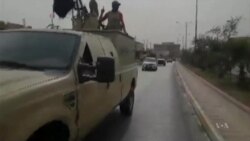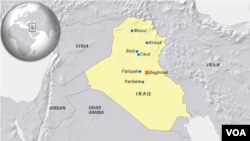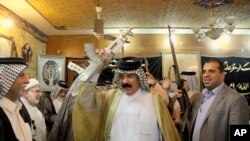LONDON —
Iraq’s most senior Shia cleric has issued a call to arms to worshippers, to defend the country against an advance by the Sunni militant group known as the Islamic State of Iraq in the Levant, or ISIL. ISIL forces have captured large swaths of Iraq’s north and are closing in on the capital. Fears are growing of a Sunni-Shia sectarian war.
Iraqi government forces are battling ISIL militants just 80 kilometers from Baghdad.
The speed of the Islamists’ advance has shaken Iraq and its allies.
ISIL draws strength from anti-government feeling among Iraq’s Sunni population, according to Ranj Alaaldin of the London School of Economics.
“They know that in places like Mosul, in Anbar, in the Nineveh province more generally, that they can get local support," said Alaaldin. "That the local community themselves are disenfranchised or they feel alienated by the central government in Baghdad, the Shia-dominated government in Baghdad.”
Thousands of civilians - mainly Shias - are arriving at recruitment centers in Baghdad to volunteer to fight the militants.
Iraq’s most revered Shia cleric, Grand Ayatollah Ali al-Sistani, issued a call to arms Friday. His spokesman, Sheikh Abdul-Mahdi Al Karbalaie, delivered the message.
The sheikh said “We call on all citizens who can carry weapons and fight the terrorists in defense of their country, its people and its holy sites to volunteer and join the security forces to fulfill this sacred goal.”
Professor Jonathan Eyal of the Royal United Services Institute in London said Iraq’s Sunni-Shia divide threatens to erupt into civil war.
“If it is entirely seen as a Shia counteroffensive against the Sunnis, that could end up strengthening actually ISIS’s control. And it could end up being a self-fulfilling prophecy of dividing the country,” said Eyal.
A return to the darkest days of sectarian bloodshed would provide a fertile recruiting ground for extremist groups like ISIL, said Alaaldin of LSE.
“I don’t think they can take Baghdad in the same way they did Mosul. What they might try to do instead is to trigger a civil war, create the kind of instability we saw in ’06 and ’07. The only difference is this time round, the Americans aren’t there,” said Alaaldin.
United States and coalition troops withdrew from Iraq in late 2011. Washington has not ruled out a military response to the ISIL advance. But the West is highly unlikely to get deeply involved in any conflict in Iraq or Syria, according to Shiraz Maher of the International Center for the Study of Radicalization at Kings College London.
“Not least because there is a lack of political will and public opinion that won’t support it. So essentially what you have is two failed states [Iraq and Syria], in which you have these completely ungoverned spaces and right now the jihadists are holding them. Who’s going to change that balance of power?” asked Maher.
Analysts say ISIL’s offensive once more has laid bare the bitter sectarian fault lines of Iraq. They fear that the very future of the Iraqi state is uncertain.
Iraqi government forces are battling ISIL militants just 80 kilometers from Baghdad.
The speed of the Islamists’ advance has shaken Iraq and its allies.
ISIL draws strength from anti-government feeling among Iraq’s Sunni population, according to Ranj Alaaldin of the London School of Economics.
“They know that in places like Mosul, in Anbar, in the Nineveh province more generally, that they can get local support," said Alaaldin. "That the local community themselves are disenfranchised or they feel alienated by the central government in Baghdad, the Shia-dominated government in Baghdad.”
Islamic State of Iraq and the Levant
Islamic State of Iraq and the Levant- Formed by members of al-Qaida-linked groups in Syria and Iraq
- Aims to establish an Islamic emirate across Syria and Iraq
- Led by Abu Bakr al-Baghdadi, former leader of al-Qaida in Iraq
- Believed to have 5,000 to 7,000 fighters
- Has launched high-profile attacks in both countries
Iraq’s most revered Shia cleric, Grand Ayatollah Ali al-Sistani, issued a call to arms Friday. His spokesman, Sheikh Abdul-Mahdi Al Karbalaie, delivered the message.
The sheikh said “We call on all citizens who can carry weapons and fight the terrorists in defense of their country, its people and its holy sites to volunteer and join the security forces to fulfill this sacred goal.”
Professor Jonathan Eyal of the Royal United Services Institute in London said Iraq’s Sunni-Shia divide threatens to erupt into civil war.
“If it is entirely seen as a Shia counteroffensive against the Sunnis, that could end up strengthening actually ISIS’s control. And it could end up being a self-fulfilling prophecy of dividing the country,” said Eyal.
A return to the darkest days of sectarian bloodshed would provide a fertile recruiting ground for extremist groups like ISIL, said Alaaldin of LSE.
“I don’t think they can take Baghdad in the same way they did Mosul. What they might try to do instead is to trigger a civil war, create the kind of instability we saw in ’06 and ’07. The only difference is this time round, the Americans aren’t there,” said Alaaldin.
United States and coalition troops withdrew from Iraq in late 2011. Washington has not ruled out a military response to the ISIL advance. But the West is highly unlikely to get deeply involved in any conflict in Iraq or Syria, according to Shiraz Maher of the International Center for the Study of Radicalization at Kings College London.
“Not least because there is a lack of political will and public opinion that won’t support it. So essentially what you have is two failed states [Iraq and Syria], in which you have these completely ungoverned spaces and right now the jihadists are holding them. Who’s going to change that balance of power?” asked Maher.
Analysts say ISIL’s offensive once more has laid bare the bitter sectarian fault lines of Iraq. They fear that the very future of the Iraqi state is uncertain.







